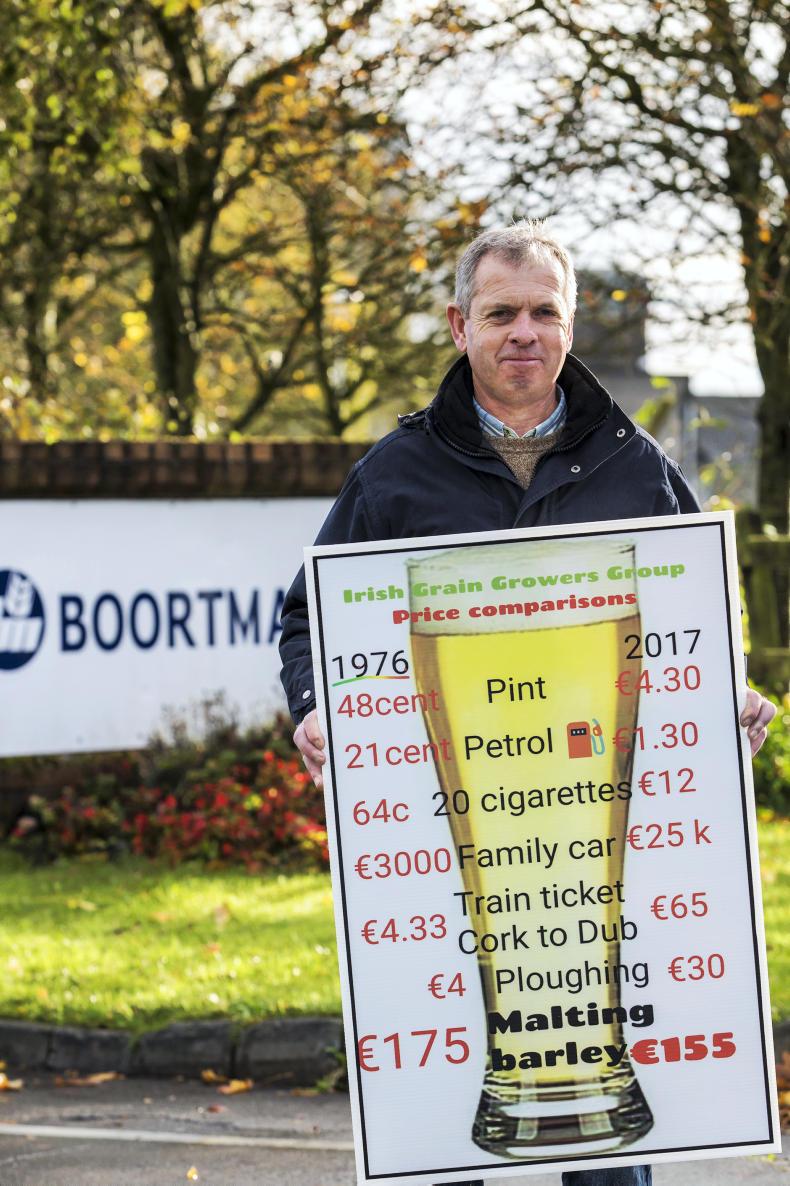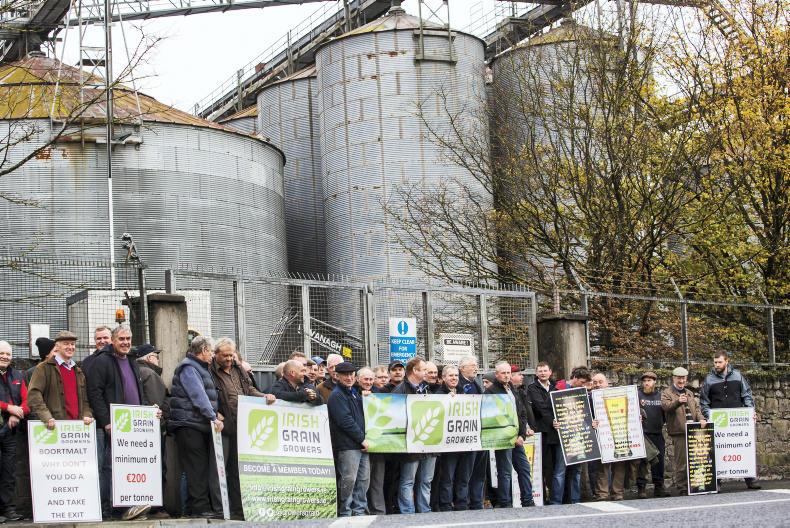Malting barley must be a minimum of €200, the Irish Grain Growers (IGG) say. About 75 growers gathered outside the gates of Minch Malt in Athy, the base of Boortmalt in Ireland.
The malt barley price paid by Boortmalt, Ireland’s largest maltster, to its 600 customers falls way short of that mark this year.
The price, determined by a mechanism pre-agreed with the IFA, only reached €155/t this year, about €15 at most ahead of feed barley. IGG, an independent grain farmers’ organisation, believes the model, described last week by Boortmalt chief operating officer Peter Nallen as “the most sophisticated pricing system for malting barley in Europe,” should be dismantled as it is failing farmers.
 ”Tillage farmers are well short of the average industrial wage. We need €200/t for malting barley to even consider staying in business,” said IGG chair Bobby Miller (pictured). “We’re all proud to be tillage farmers and want to stay as tillage farmers. We’re going to keep this sustained protest going, the next stop is the Guinness Storehouse if things don’t improve”. IGG wants a further €20/t bonus for distilling grade malt barley, which requires hard-to-achieve low protein levels.
”Tillage farmers are well short of the average industrial wage. We need €200/t for malting barley to even consider staying in business,” said IGG chair Bobby Miller (pictured). “We’re all proud to be tillage farmers and want to stay as tillage farmers. We’re going to keep this sustained protest going, the next stop is the Guinness Storehouse if things don’t improve”. IGG wants a further €20/t bonus for distilling grade malt barley, which requires hard-to-achieve low protein levels.
IGG leadership said that if Guinness were to increase the price of the pint by just 1c and pass that back to the grower, it would restore profitability and viability to the sector. Failing that, they called on the price of the pint to be lowered by 10c. The argument IGG is making is that Guinness increased prices in 2012, citing the rising cost of barley.
Pricing system ‘failed’ farmers
Fellow IGG founder Colm Fingleton called on the IFA to stand down from negotiating on behalf of farmers. Fingleton said the pricing system “has failed us for three of the last five years, and failed us completely. We cannot have another situation where a deal is shoved through to growers without their vote, without their support, and at meetings attended by about 20 people”.
He also criticised the fact that IFA deputy president Richard Kennedy is leading negotiations. “We certainly will not have a dairy man representing and doing deals for our tillage industry any more.”  An IGG member, James Kelly (pictured) had been the previous chair of the IFA’s malt negotiating committee, but his tenure was dogged as the committee divided along IFA v IGG lines on almost every issue.
An IGG member, James Kelly (pictured) had been the previous chair of the IFA’s malt negotiating committee, but his tenure was dogged as the committee divided along IFA v IGG lines on almost every issue.
Don’t cut Guinness price, IFA says
Cutting the price of Guinness “or any other product” will not help Irish grain growers, the IFA maintains. In a statement issued at the same time as the IGG protest was being held in Athy, IFA said that its experience is that “reductions in retail prices eventually get pushed back down the chain in the form of price cuts to farmers”.
The IFA revealed that it had sent a delegation of malting barley growers to meet representatives from Boortmalt led by Koenraad Dumont, the group’s chief commercial officer who is based in Antwerp. The IFA stressed to Boortmalt that there needs to be a significant uplift in the price of malting barley, and an additional premium for distilling barley.
Read more
Listen: ‘Malting barley pays less than forestry’
Malting barley must be a minimum of €200, the Irish Grain Growers (IGG) say. About 75 growers gathered outside the gates of Minch Malt in Athy, the base of Boortmalt in Ireland.
The malt barley price paid by Boortmalt, Ireland’s largest maltster, to its 600 customers falls way short of that mark this year.
The price, determined by a mechanism pre-agreed with the IFA, only reached €155/t this year, about €15 at most ahead of feed barley. IGG, an independent grain farmers’ organisation, believes the model, described last week by Boortmalt chief operating officer Peter Nallen as “the most sophisticated pricing system for malting barley in Europe,” should be dismantled as it is failing farmers.
 ”Tillage farmers are well short of the average industrial wage. We need €200/t for malting barley to even consider staying in business,” said IGG chair Bobby Miller (pictured). “We’re all proud to be tillage farmers and want to stay as tillage farmers. We’re going to keep this sustained protest going, the next stop is the Guinness Storehouse if things don’t improve”. IGG wants a further €20/t bonus for distilling grade malt barley, which requires hard-to-achieve low protein levels.
”Tillage farmers are well short of the average industrial wage. We need €200/t for malting barley to even consider staying in business,” said IGG chair Bobby Miller (pictured). “We’re all proud to be tillage farmers and want to stay as tillage farmers. We’re going to keep this sustained protest going, the next stop is the Guinness Storehouse if things don’t improve”. IGG wants a further €20/t bonus for distilling grade malt barley, which requires hard-to-achieve low protein levels.
IGG leadership said that if Guinness were to increase the price of the pint by just 1c and pass that back to the grower, it would restore profitability and viability to the sector. Failing that, they called on the price of the pint to be lowered by 10c. The argument IGG is making is that Guinness increased prices in 2012, citing the rising cost of barley.
Pricing system ‘failed’ farmers
Fellow IGG founder Colm Fingleton called on the IFA to stand down from negotiating on behalf of farmers. Fingleton said the pricing system “has failed us for three of the last five years, and failed us completely. We cannot have another situation where a deal is shoved through to growers without their vote, without their support, and at meetings attended by about 20 people”.
He also criticised the fact that IFA deputy president Richard Kennedy is leading negotiations. “We certainly will not have a dairy man representing and doing deals for our tillage industry any more.”  An IGG member, James Kelly (pictured) had been the previous chair of the IFA’s malt negotiating committee, but his tenure was dogged as the committee divided along IFA v IGG lines on almost every issue.
An IGG member, James Kelly (pictured) had been the previous chair of the IFA’s malt negotiating committee, but his tenure was dogged as the committee divided along IFA v IGG lines on almost every issue.
Don’t cut Guinness price, IFA says
Cutting the price of Guinness “or any other product” will not help Irish grain growers, the IFA maintains. In a statement issued at the same time as the IGG protest was being held in Athy, IFA said that its experience is that “reductions in retail prices eventually get pushed back down the chain in the form of price cuts to farmers”.
The IFA revealed that it had sent a delegation of malting barley growers to meet representatives from Boortmalt led by Koenraad Dumont, the group’s chief commercial officer who is based in Antwerp. The IFA stressed to Boortmalt that there needs to be a significant uplift in the price of malting barley, and an additional premium for distilling barley.
Read more
Listen: ‘Malting barley pays less than forestry’
 ”Tillage farmers are well short of the average industrial wage. We need €200/t for malting barley to even consider staying in business,” said IGG chair Bobby Miller (pictured). “We’re all proud to be tillage farmers and want to stay as tillage farmers. We’re going to keep this sustained protest going, the next stop is the Guinness Storehouse if things don’t improve”. IGG wants a further €20/t bonus for distilling grade malt barley, which requires hard-to-achieve low protein levels.
”Tillage farmers are well short of the average industrial wage. We need €200/t for malting barley to even consider staying in business,” said IGG chair Bobby Miller (pictured). “We’re all proud to be tillage farmers and want to stay as tillage farmers. We’re going to keep this sustained protest going, the next stop is the Guinness Storehouse if things don’t improve”. IGG wants a further €20/t bonus for distilling grade malt barley, which requires hard-to-achieve low protein levels.  An IGG member, James Kelly (pictured) had been the previous chair of the IFA’s malt negotiating committee, but his tenure was dogged as the committee divided along IFA v IGG lines on almost every issue.
An IGG member, James Kelly (pictured) had been the previous chair of the IFA’s malt negotiating committee, but his tenure was dogged as the committee divided along IFA v IGG lines on almost every issue. 







SHARING OPTIONS